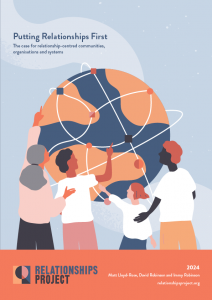In brief
As an election looms David Robinson reflects, in this very personal blog, on the stories of relationship centred-practitioners as told in our the Relationships Case Maker. Far
away from Westminster and Whitehall, he says, the relationship-centred revolution is already rolling in. It is time for government to catch up.
A country re-centred on relationships

It is almost 27 years since Tony Blair delivered his first major speech as Britain’s new PM. Standing in the sunshine, sleeves rolled up, on the troubled Aylesbury Estate in south London, he spoke about relationships, about shifting from “too late cure to early prevention” and “liberating funds from government silos”
“We will not just do things because that’s the way they have always been done….” he said … “we will back anyone if they can deliver the goods”.
Change at last, we thought. No more picking up the pieces, make do and mend. The new government would be connecting the mighty silos, listening, learning, backing collaboration, and real community engagement. A country re-centred on meaningful relationships.
Even then those ideas weren’t new. We had been pressing the case and walking the talk at Community Links for many years, many others had been too, but to those of us listening that day, it still felt like a moment.
It wasn’t.
The Blair and Brown administrations, in which I played a tiny part, did many good things but a fundamental shift in how the state works with and for its people, particularly those in greatest need, is unfinished business.
The torch for what has come to be called the relational state is now ably born by many kindred spirits and there are lots of terrific, practical exemplars across the UK, but we are still waiting, still sweating, for the revolution.
I’m getting old. We need to get a wiggle on.
The Case Makers

In the Relationships Case Maker, published a couple of weeks ago, we tell the stories of nine “Case Makers” – examples of relational practice in areas as diverse as children’s services, palliative care and offender rehabilitation. All, in Blairs memorable phrase, delivering the goods. Reflecting on those stories and listening to politicians gearing up for another election, I think again about the Blair speech.
A world in which our leaders put relationships first, systematically and in every context, and where our organisations and systems are institutionally relational, would be revolutionary. But governments don’t lead revolutions. Revolutions lead governments.
I’m not saying that the thinkers in their think tanks shouldn’t press the case with the policy makers and the politicians, but I am saying that away from Westminster and Whitehall there is another world and here the tides are turning.
The services and organisations in the Case Maker work because everything works better when relationships work well. We know this not only because it is the universal human experience, fundamental to who we are and who we want to be, but also because we have the evidence, clear, irresistible and everywhere we look.
It is, in many ways, a most unrevolutionary revolution, common sense made common practice, instinctive and organic, human beings being human. But still, it is a revolution, and its growing from the ground up, not the blue sky down.

Saskie Dorman, a palliative care consultant in the south west of England told us about the experience of championing a relational approach in the NHS.
“When we talk about the whole system needing to change it can feel overwhelming and disempowering…. Focusing on what we can do enables change to start.”
Rather than “rolling out” system wide strategies, Saskie prefers to talk about “rolling in” to our own practice the things that work elsewhere, copying and adapting, “careful horizontal transfer and collaborative learning”.
Others featured in the Case Maker use different language to describe a similar approach. Context matters here.
Intentions may be national but practice is profoundly local. Re-centring on relationships, one by one, is nothing if it isn’t personal and bespoke.
We have been delighted by the enthusiastic response to the publication. This echoes a message that has been coming through from our communities of practice, our events and especially our training work: there is a large and growing appetite for rolling in relational practice. It is often challenging – a lot of our work is with the “sympathetic but stuck” – but the commitment on the ground is undeniable.
Five things for government to do
There are practical things that the next government could do to turbo charge the shift. Here’s five:

Establish a mechanism for examining every manifesto commitment, and subsequently every major policy, from a relational or community perspective. Ask not only what is the role of government or what is the role of the service, but also what is the role of the community in addressing this issue? The Opposition is currently ensuring that every commitment is fully costed. It should apply the same rigour to ensuring that every mission, and within every mission, every policy, engages the people that it seeks to serve.

Require every statutory body to establish a community easement function for locating and shifting the barriers to community engagement.

Require every statutory body to establish a matching workforce easement function for digging out the obstacles to relational practice with its own workforce.

Introduce a Community Power of Competence. The General Power of Competence gives local authorities the ability to do anything that is not proscribed in law. A matching community power would be similarly liberating.

These simple measures would be hugely helpful but a thriving relational state won’t spring from a Whitehall blueprint. It will be, it is being, co-produced wherever there are relationship-centred practitioners delivering the goods. The revolution is already rolling in.
These days I have less time for the speeches. I’m itching for the moment when the next Prime Minister looks from the window, sees the surging crowd and, like revolutionary leader Ledru-Rollin, declares to the world, “I must follow them because I am their leader”.

Relationships Case Maker
Few people argue that relationships don’t matter, but many feel they don’t have the time, capacity or permission to prioritise them. This Case Maker assembles the evidence base for putting relationships first, describing why relationships matter, what great relationship-centred practice looks like, and how it could make an impact in your context.
Related blogs
How to have it all: relational offsetting
In brief This month, the UK government announced a huge public rollout of AI. If the plans embrace relational offsetting, it could allow us to prioritise human relationships where they really matter. Our hope is that 2025 will be the year when relational offsetting...
The man in the hospital
David Robinson reflects on a day at the hospital. As Health and Social Care Secretary Wes Streeting consults on the future of the NHS, David makes the case for “critical synergy”. “We want the awesome science”, he says. “We also want good relationships - warmth and...
“So what are you going to do now?”: Reflection on the US Presidential election
On the morning after the night before, David Robinson offers a Relationships Project perspective on the US presidential election. A friend messaged me on the morning after the US election: “So what are you going to do now?” He has always been sufficiently interested...



